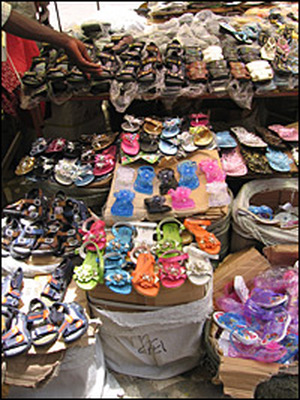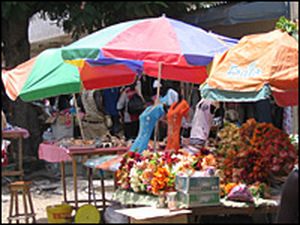Army Of Shopowners Paved China's Way In Africa



Wang Gang, a smiling, bespectacled man who goes by the name "Steel," moved to Senegal from China five years ago and set up a shop in Dakar. He sells footwear, scarves, shawls and an assortment of other low-priced "Made in China" goods.
Although his business is small, he is part of an army of Chinese shopkeepers in Africa that paved the way for big Chinese investors who have funded gigantic infrastructure projects there.
"Long, long ago, my friend came here for business and introduced me to Dakar to sell Chinese products," says Wang, who adds that his name in Chinese means steel. "I hope I can make a big market in Africa in the future, and maybe I will have good luck."
Outside in the sweltering Senegalese heat, female shoppers dressed in brightly colored boubous, the traditional voluminous West African gowns, rummage through piles of shiny trinkets and Chinese knickknacks in a market stall.
The Vanguard Of Chinese Investment
Adama Gaye, a Senegalese author and commentator, says Chinese merchants were the vanguard of Beijing's major investment in Africa. These shopkeepers, fanning out over the entire continent, were the pioneers who preceded big business from China.
"These people represent a new form of colonialism with an Asian face that is coming to Africa," says Gaye, a visiting fellow at Johns Hopkins University, who published the book China-Africa: The Dragon and the Ostrich in 2006.
"The influx of Chinese business people onto the streets of Dakar is quite a phenomenon," Gaye says. "One street, the Boulevard General de Gaulle — named after the French wartime leader — could be called Boulevard Mao Tse-Tung, because it is dominated by the Chinese," he says with a smile.
He says China has adopted a subtle approach to wooing Africa — unlike the continent's original colonial masters.
"When they came to Africa three centuries ago, they used the barrel of the gun," Gaye says. "They came with boats, they controlled ports and forts and physically dominated places. The Chinese did it in a soft way."
The Chinese merchants, he says, were "the advance force that has allowed opening up of new territories, including Senegal, and they were followed up later on by the big companies and then the political leaders." He adds that these ordinary people became China's eyes and ears in territories such as Senegal.
"They are very useful in the grand strategy that China is deploying across the world," Gaye says.
But cheap, mass-produced Chinese imports like those that Wang sells are flooding African markets and crippling some local industries, including textiles.
Africa cannot compete with the eye-catching Chinese fabrics and Chinese-made African prints that sell at a fraction of the price. Factories are closing down, and jobs are being lost.
But many shoppers in Senegal, like Khady Sall, point out that the Chinese stores are affordable. She fills a bag with headscarves, sandals and perfume — "imitation though," she says with a laugh, "but cheap."
With Senegal's rising cost of living, Sall says, the Chinese goods are an excellent value and suit everyone's wallet.
"Everyone can afford to buy something," Sall says. "They're quite cheap and pretty good quality."
Trade between Africa and China topped more than $55 billion in 2006 — up fivefold since 2000. That's still well below the more than $70 billion in U.S.-Africa trade.
Beijing hopes two-way trade with the continent will hit $100 billion by 2020.
Wang, the Chinese shopkeeper, wants to be part of that boom. He says he expects to spend another few years in Senegal.
"We'll see — maybe one, two, three, four, maybe more if the market is suitable for me. Maybe I can stay here for a long time," Wang says.
Dozens of Chinese-owned shops and market stalls line a wide avenue in Centenaire, an area of Dakar. Ten years ago, there was only a handful.
Wang says the glut of shops has hurt his business. "The competition is more than before — for everything," he says.
'An Unbalanced Relationship'
While the influx of Chinese capital might be attractive, Gaye warns that China knows what it wants from Africa and "has come with a strategy." Africa, he says, has not done the same homework.
"There is no strategic continental approach that African countries have adopted," Gaye says. "No think tank, no task force, no inclusion of Chinese language into universities, no coordinated approach. This should be the role of the African Union."
"Overall," Gaye says, "it's an unbalanced relationship in which China knows what it wants and has a clearly defined agenda."
"The question, indeed, is what is Africa doing in the face of these challenges?" Gaye says. "Nothing. It's as if African countries are rushing to China, bowl in hand. And China naturally is in a best position to take advantage, whereas African countries are almost powerless and just expecting China to be the new messiah."
Gaye compares the renewed global interest in Africa's raw materials and markets with suitors lining up to court the continent. China, hungry for all the natural resources it can get, is determined to win Africa's hand, he says.
"China is in a position to be in the heart of Africa," Gaye says. "And the West? They are losing out. If Africa plays its cards well, I think Africa has never been in a better position."
But Gaye says it's up to the continent to make the most of the marriage with China.
No comments:
Post a Comment
Comments always welcome!